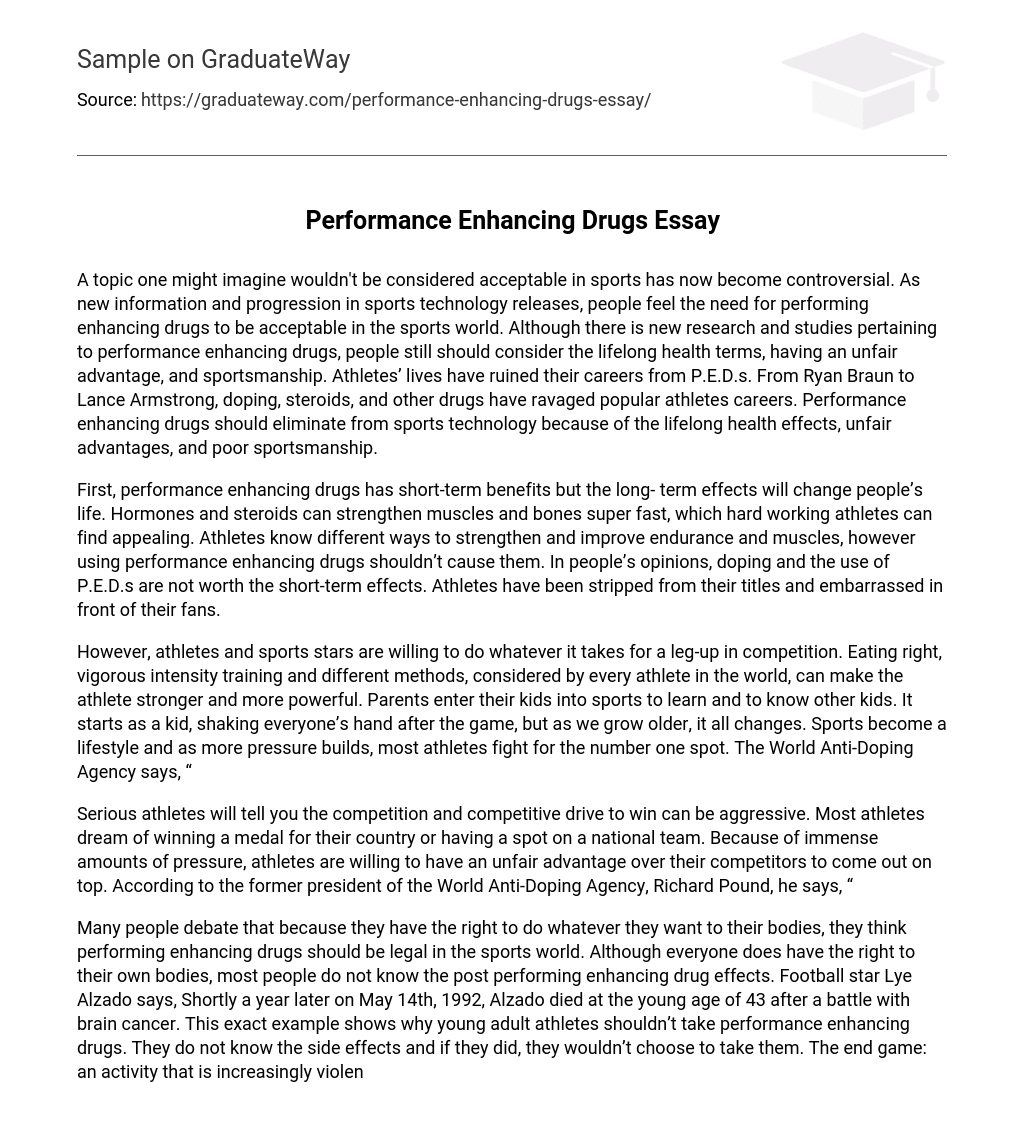A topic one might imagine wouldn’t be considered acceptable in sports has now become controversial. As new information and progression in sports technology releases, people feel the need for performing enhancing drugs to be acceptable in the sports world. Although there is new research and studies pertaining to performance enhancing drugs, people still should consider the lifelong health terms, having an unfair advantage, and sportsmanship. Athletes’ lives have ruined their careers from P.E.D.s. From Ryan Braun to Lance Armstrong, doping, steroids, and other drugs have ravaged popular athletes careers. Performance enhancing drugs should eliminate from sports technology because of the lifelong health effects, unfair advantages, and poor sportsmanship.
First, performance enhancing drugs has short-term benefits but the long- term effects will change people’s life. Hormones and steroids can strengthen muscles and bones super fast, which hard working athletes can find appealing. Athletes know different ways to strengthen and improve endurance and muscles, however using performance enhancing drugs shouldn’t cause them. In people’s opinions, doping and the use of P.E.D.s are not worth the short-term effects. Athletes have been stripped from their titles and embarrassed in front of their fans.
However, athletes and sports stars are willing to do whatever it takes for a leg-up in competition. Eating right, vigorous intensity training and different methods, considered by every athlete in the world, can make the athlete stronger and more powerful. Parents enter their kids into sports to learn and to know other kids. It starts as a kid, shaking everyone’s hand after the game, but as we grow older, it all changes. Sports become a lifestyle and as more pressure builds, most athletes fight for the number one spot. The World Anti-Doping Agency says, “
Serious athletes will tell you the competition and competitive drive to win can be aggressive. Most athletes dream of winning a medal for their country or having a spot on a national team. Because of immense amounts of pressure, athletes are willing to have an unfair advantage over their competitors to come out on top. According to the former president of the World Anti-Doping Agency, Richard Pound, he says, “
Many people debate that because they have the right to do whatever they want to their bodies, they think performing enhancing drugs should be legal in the sports world. Although everyone does have the right to their own bodies, most people do not know the post performing enhancing drug effects. Football star Lye Alzado says, Shortly a year later on May 14th, 1992, Alzado died at the young age of 43 after a battle with brain cancer. This exact example shows why young adult athletes shouldn’t take performance enhancing drugs. They do not know the side effects and if they did, they wouldn’t choose to take them. The end game: an activity that is increasingly violent, extreme, and meaningless, practiced by chemical or genetic mutants. Also, the use of performance enhancing drugs is not accidental; planned and deliberate with the sole objective of getting an unfair advantage. Athletes are always trying to seek an advantage over their competitors. President Emeritus of the Hasting center, Thomas H. Murray says, “
Performance enhancing drugs have lifelong health effects, unfair advantages, poor sportsmanship and should never be used in the athlete world. If you or a fellow athlete considers performing enhancing drugs, please also consider the effects. Not only the cheating and dangerous health effects could damage your life, but getting caught could mean you’ll never compete in the sport you love again. Athletes all around the world should know of the side effects and lifelong health effects of these drugs and other substances.





